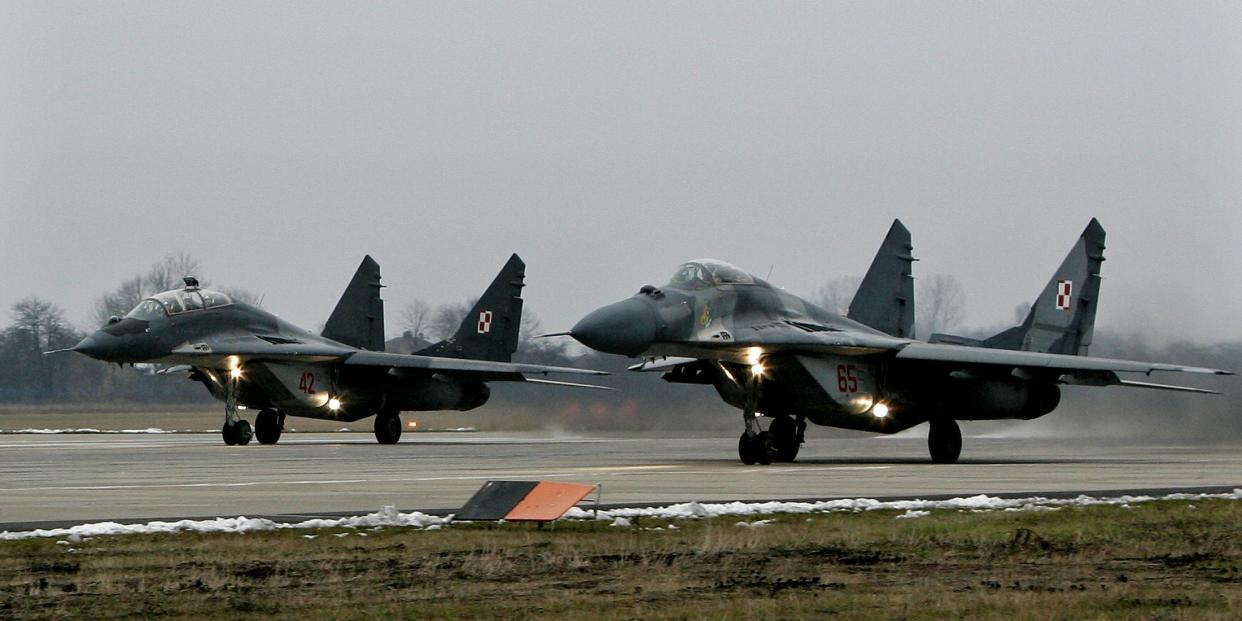Pentagon rejects Poland's offer to send fighter jets to the US to send to Ukraine, saying it raises 'serious concerns for the entire NATO alliance'

Poland on Tuesday offered to send fighter jets to Ukraine via a US air base in Germany.
The Pentagon rejected the offer, saying it "raises serious concerns" for NATO.
Zelenskyy thanked Poland on Wednesday and criticized the US response, saying "Listen: We have a war!"
The Department of Defense on Tuesday rejected an offer from Poland, a fellow NATO member, to send fighter jets to a US air base to send to Ukraine for use against Russian forces.
For weeks President Volodymyr Zelenskyy has called on the US and other NATO nations to provide Ukraine with warplanes so it can defend itself from Russian attacks.
However, the US and NATO have refrained from doing so, fearing the move would escalate tensions with Russia and stoke a wider conflict.
On Tuesday, Poland's foreign ministry offered to send all of its Russian-made MiG-29 fighter jets to the US Air Force's Ramstein Air Base in Germany, so they could be sent on to Ukraine's forces.
"The Polish Government also requests other NATO Allies — owners of MIG-29 jets — to act in the same vein," it said.
But the Pentagon rejected the offer later that day, with spokesman John Kirby tweeting that the prospect of US-linked fighter jets "departing from a US/NATO base in Germany to fly into airspace that is contested with Russia over Ukraine raises serious concerns for the entire NATO alliance."
"It is simply not clear to us that there is a substantive rationale for it," Kirby said.
"We will continue to consult with Poland and our other NATO allies about this issue and the difficult logistical challenges it presents, but we do not believe Poland's proposal is a tenable one."
In a speech Wednesday, Ukrainian President Volodymyr Zelenskyy thanked Poland for offering the planes, but criticized the US for sending mixed signals.
"Russia uses missiles, aircraft, helicopters against us, against civilians, against our cities, against our infrastructure. This is the world's humanitarian duty to respond. But ... There is no decision," he said.
"So when will the decision be made? Listen: We have a war! We do not have time for all these signals. This is not ping pong! This is about human lives! We ask once again: solve it faster. Do not shift the responsibility, send us planes."
Though the Pentagon declined to support the Polish plan on Tuesday, US Secretary of State Antony Blinken has previously suggested it was in favor of the general transfer of Polish jets to Ukraine.
"That gets a green light, in fact we're talking with our Polish friends right now about what we might be able to do to backfill their needs if in fact they chose to provide these fighter jets to the Ukrainians," Blinken told CBS News' "Face the Nation" on Sunday.
"What can we do, how can we help to make sure they get something to backfill the planes that they're handing over to the Ukrainians."
Kirby said on Tuesday it was up to Polish officials if they wanted to send their own jets to Ukraine directly.
"The decision about whether to transfer Polish-owned planes to Ukraine is ultimately one for the Polish government," he said.
It also appears that Poland's offer caught the US by surprise.
"It wasn't pre-consulted with us that they planned to give these planes to us," Victoria Nuland, the State Department Undersecretary of State for Political Affairs, told a Senate Foreign Relations Committee hearing on Tuesday, Reuters reported.
"So I think that actually was a surprise move by the Poles."
The US sent two US Patriot missile-defense batteries to Poland on Tuesday.
"This defensive deployment is being conducted proactively to counter any potential threat to US and Allied forces and NATO territory," US European Command spokeswoman Capt. Christina Judd said.
Read the original article on Business Insider

 Yahoo Movies
Yahoo Movies 
